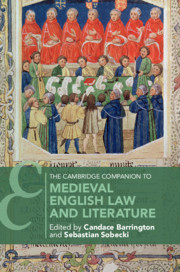Book contents
- The Cambridge Companion to Medieval English Law and Literature
- The Cambridge Companion to Medieval English Law and Literature
- Copyright page
- Contents
- Illustrations
- Contributors
- Abbreviations
- Preface
- Part I Legal Contexts
- Part II Literary Texts
- 7 Treason
- 8 Complaint Literature
- 9 Political Literature and Political Law
- 10 William Langland
- 11 Geoffrey Chaucer
- 12 John Gower
- 13 Lollards and Religious Writings
- 14 Lancastrian Literature
- 15 Middle English Romance and Malory’s Morte Darthur
- 16 Marriage and the Legal Culture of Witnessing
- Index
- References
8 - Complaint Literature
from Part II - Literary Texts
Published online by Cambridge University Press: 26 July 2019
- The Cambridge Companion to Medieval English Law and Literature
- The Cambridge Companion to Medieval English Law and Literature
- Copyright page
- Contents
- Illustrations
- Contributors
- Abbreviations
- Preface
- Part I Legal Contexts
- Part II Literary Texts
- 7 Treason
- 8 Complaint Literature
- 9 Political Literature and Political Law
- 10 William Langland
- 11 Geoffrey Chaucer
- 12 John Gower
- 13 Lollards and Religious Writings
- 14 Lancastrian Literature
- 15 Middle English Romance and Malory’s Morte Darthur
- 16 Marriage and the Legal Culture of Witnessing
- Index
- References
Summary
To the right sage and full wise Comunes of this present parlement
Besecheth mekely your right sage and wyse discrecions Isabell that was the wife of Iohn Boteler of Beausey in the Shire of Lancaster Knight to consider that where one william Pulle … the seid Isabell beyng atte Beausey … with force and armes … felonousely and most horribely rauysshed … her naked except hir kirtyll and hir smokke ledde with hym into the wilde and desolate places of wales … if he appier not … that than he stand atteint of high Tresoun … consideryng that the seid rauysshyng is done in more horrible wise and with more heynouse violence than any hath be sene or knawen before this tyme.
(Petition of Isabel Boteler to Parliament, 1437)- Type
- Chapter
- Information
- Publisher: Cambridge University PressPrint publication year: 2019

